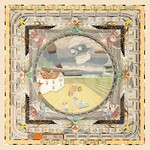ALBUM REVIEW: William Elliott Whitmore’s ‘Radium Death’ sincerely hits home


William Elliott Whitmore
‘Radium Death’
Rating: 




William Elliott Whitmore may not be a name many have heard of in today’s musical landscape, and considering he has been making music since 2009, that is a damn shame! To be fair, it was only a month or so ago that I became familiar with his music and, more importantly, his latest album. Since discovering “Radium Death,” I have not taken it out of my car stereo and, when I do, it sure as hell will never leave steady rotation. There is a quality to WEW (as fans have come to call him), his songs, lyrics, and his take on the “alt-country” and folk genres that is absolutely startling.
Any country singer/songwriter can entertain, but the greats make the listener feel the weight of the lyrics and the emotion behind them. Johnny Cash was one such artist who could do that to a crowd. Mike Ness (of Social Distortion), especially in his solo country-influenced works, is another artist who has that ability. When their songs play, you get a sense that they have seen some shit in their lives; WEW is exactly the same. His songwriting ability, along with his raspy vocals, helps to send his songs a little too close to home for the listener. That is precisely what makes “Radium Death” so special; it is familiar.
“Radium Death” starts off with the uptempoed track “Healing to Do.” The theme of this song is universal to every man and woman who has every walked this spinning rock; times are tough, so endure those shitty times because they won’t stay that way. The chorus repeats, “This world is strange / I guess we’ve all got some healing to do,” as the song motors on before coming to an end in a long, hoarse howl that erupts out of Whitmore in dissension to those hard times.
“Civilizations,” the next track on the album, features only WEW and his banjo. This acoustic song, and its slowed tempo, creates a pace that allows the listener to reflect on the lyrics. It’s also about enduring, but this time, it’s the world around us we have to withstand. “Civilizations, they come and they go,” but the one thing that is constant are the people who live in them.
The third track, “Trouble in Your Heart,” quickens the pace once again, and if any song off this album has a chance of staying with you throughout your day once the music ends, it will be this one. In it, WEW sounds like every best friend we have ever had in our lives. He asks the questions that need to be asked, provides the advice we all need to hear at some point in time, and reassures us that we are stronger than we may believe. The track is heartfelt and sincere and, while listening, it will make one wonder how he’s able to connect to us and hit those points. I’m hesitant to call it “an instant classic,” but it sure as hell is one fine track that deserves as much attention as it can get.
Whitmore plays with the tempo throughout the album. Just when you’d expect “Radium Death” to find its standard pacing, WEW begins switching it like the tides. Tracks like “Go on Home” and “Can’t Go Back” are somber because of the weight of the lyrics therein. Then, however, you’ll find tracks that pick things back up, such as “Don’t Strike Me Down.” And hell, WEW even finds a place on the album for a good old-fashioned drinking anthem about moonshine; “South Lee County Brew.” The final track, “Ain’t Gone Yet,” starts off as a slow, mindful ballad and ramps things up about halfway through to a raucous, uplifting reminder for us to live life to the fullest while we are still here.
Whitmore’s “Radium Death” feels like an album that doesn’t come around often. Aside from it being musically and lyrically enthralling and meaningful, it is honest and sincere. And, from what I’ve read about WEW, that is exactly who he seems to be as a person as well. This album took me by surprise in the best way possible. It has a unique ability to mix uplifting themes with, at times, more somber notes. It is also an expression of solidarity, showing that, in rough times and circumstances, we stand together.



